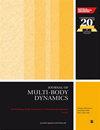考虑重力的离心摆式减振器在发动机低速下的响应
IF 1.9
4区 工程技术
Q3 ENGINEERING, MECHANICAL
Proceedings of the Institution of Mechanical Engineers Part K-Journal of Multi-Body Dynamics
Pub Date : 2022-06-01
DOI:10.1177/14644193221075452
引用次数: 7
摘要
研究了离心摆式减振器在离心力和重力场作用下的性能。重点是确定影响噪声、振动和粗糙度(NVH)问题的因素,这些问题是由于离心摆减震器处于发动机低转速(如发动机启停或怠速)而引起的。因此,采用第二类拉格朗日方程建立了数学模型,采用多尺度法得到了解析解,并推导了几个描述吸振器运动的简单初等数学方程。将解析解与完全非线性运动方程的数值模拟结果进行了比较,表明解析解适用于研究CPVA的性能。对四吸波器和两吸波器在重力场下的应用进行了理论分析。在较低的发动机转速范围或较小的粘性阻尼等特殊条件下,减振器在重力场中并不总是同步的。结果表明,较大的粘性阻尼系数可以改善系统的同步性或减小激励转矩变化引起的非线性跳变范围。进一步确定了CPVA在重力场作用下的超谐波共振,并计算了精确响应,其中定义了“二阶响应重力影响因子”。此外,分析了CPVA安装角对发动机点火角的影响,并对一组等自慢性外摆线CPVA进行了试验验证。解析解与试验结果一致,证明了研究方法和结果在车辆上的适用性。本文章由计算机程序翻译,如有差异,请以英文原文为准。
Response of centrifugal pendulum vibration absorber considering gravity at low engine speed
This study examined the performance of the centrifugal pendulum vibration absorber’s (CPVA) under the influence of centrifugal force and gravity fields. The focus was on identifying the factor that influenced noise, vibration, and harshness (NVH) problems that originate owing to the centrifugal pendulum absorber being at low engine speed such as engine start-stop or idle. Consequently, mathematical models were established employing Lagrange equation of the second kind, analytical solutions were obtained using the method of multiple scales, and several simple elementary mathematical equations describing the movement of the absorber were derived. Further, the analytical solutions were compared with the numerical simulation results of the complete non-linear equation of motion, which indicated that the former were suitable for studying the performance of CPVA. The theoretical analysis of the application with four absorbers and two absorbers under gravity field was conducted. The absorbers were found to be not always synchronized in the gravity field in certain special conditions such as lower engine speed range or small viscous damping. It was concluded that larger viscous damping coefficient can result in an improvement in the synchronization or reduce the range of nonlinear jumps caused by changes in excitation torque. Further, super-harmonic resonance of CPVA under the gravity field was determined and exact response was calculated, wherein the term “2nd order response gravity impact factor” was defined. In addition, the effects of CPVA installation angle relative to engine ignition angle were analyzed, and a set of tautochronic epicycloid CPVA was tested to verify the findings. The analytical solutions were consistent with the test results, thereby proving the applicability of the research method and results in a vehicle.
求助全文
通过发布文献求助,成功后即可免费获取论文全文。
去求助
来源期刊

CiteScore
4.10
自引率
11.10%
发文量
38
审稿时长
>12 weeks
期刊介绍:
The Journal of Multi-body Dynamics is a multi-disciplinary forum covering all aspects of mechanical design and dynamic analysis of multi-body systems. It is essential reading for academic and industrial research and development departments active in the mechanical design, monitoring and dynamic analysis of multi-body systems.
 求助内容:
求助内容: 应助结果提醒方式:
应助结果提醒方式:


